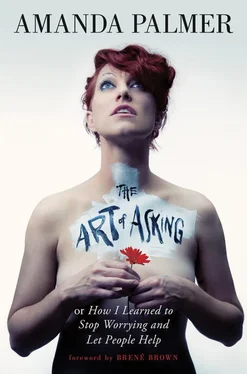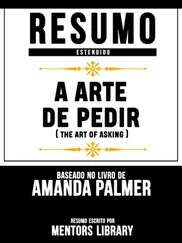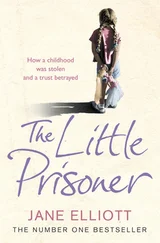I blame society , I said.
Well, we’re not alone , Alyson said. I have a couple of friends with this same problem. They make a ton of money, but not as much as their husbands, and they can’t stand feeling inadequate. I don’t think we’re crazy .
I thought about the men in my life, the ones who’d let me into their heads and hearts. Most of them didn’t have a hard time in certain departments of asking, but when it came to their emotional needs, it was a mess. They could ask for a raise, but they couldn’t ask for a hug.
I thought about Anthony. He was a professional therapist, listening to people, asking them about their deepest fears and problems all week long, and even he would clam up when things got rough. He likes being in control, he loves having answers, he loves fixing and helping people. But he has a really hard time letting people help him . Sometimes, when he gets depressed, he shuts down and doesn’t like to talk. When that happens, I figure it’s time for me to step up, ask him questions, help him through, talk about the problems. But he clams up and doesn’t like talking to anyone about his own problems. He calls it Going Into The Box.
When we ask for anything, we’re almost always asking for help in some form: help with money, permission, acceptance, advancement, help with our hearts.
Brené Brown has found through her research that women tend to feel shame around the idea of being “never enough”: at home, at work, in bed. Never pretty enough, never smart enough, never thin enough, never good enough. Men tend to feel shame around the fear of being “perceived as weak,” or more academically: fear of being called a pussy .
Both sexes get trapped in the same box, for different reasons.
If I ask for help, I am not enough .
If I ask for help, I am weak .
It’s no wonder so many of us just don’t bother to ask.
It’s too painful.
• • •
Sometimes it was like Neil was from an alien planet, where people never asked for or shared anything emotional without deeply apologizing first. He assured me that he was simply British. And that we Americans, with all of our loud oversharing and need for random hugs and free admissions to people we’ve just met of deep, traumatic childhood wounds looks just as alien to them.
When he started to trust me, he told me that he’d believed for a long time, deep down, that people didn’t actually fall in love. That they were all faking it.
But that’s impossible. You’re a professional writer , I said, and you’ve seen a thousand films and read a thousand books and memoirs and know real people authentically in love. What about John and Judith? Peter and Clare? Did you think they’re just lying? And you’ve written whole books, stories, scenes where people are deeply in love. I mean… I just don’t believe you. How could you write about love if you didn’t believe it existed?
That’s the whole point, darling , he said. Writers make things up .
• • •
While I was working on the first draft of this book (which I did over a few thousand coffees in various cafés in Melbourne), I shared a coffee with Samantha Buckingham, an Australian indie guitarist/singer-songwriter, during which I picked her brain about her process and her relationship with her own fanbase.
Sam is typical of a lot of indie musicians eking out a living. She’s not on a label, she crowdfunds and releases music directly to the Internet, she plays house parties in her fans’ living rooms. We were comparing notes about the pros and cons of Patreon.com, a new subscription service Sam was using, which allows fans to automatically deposit money into a musician’s account every time the musician releases a song, kind of like a book-of-the-month club for artists putting out content, so they can rely on a somewhat predictable income instead of praying that their Kickstarter will get funded every time they have something to release. (At the time of this writing, she’s got forty-four patrons—including nineteen $1 backers and one backer at $50—and is paid about $200 every time she releases a song. Patrons can choose how much they pay per song, and they can cap their monthly bill so she doesn’t all of a sudden dump one thousand songs on people and run off to Mexico. Although running off to Mexico when you’re Australian seems weird, so I’m thinking she would more, like, run off to Papua New Guinea.)
Sam was, in fact, about to travel to Asia with her boyfriend, and she was fretting about what her backers would think if she released some of her new songs to Patreon while she was “on vacation.” She was worried that posting pictures of herself sipping a mai tai was going to make her look like an asshole.
What does it matter where you are or whether you’re drinking a coffee, a mai tai, or a bottle of water? I asked. Aren’t they paying for your songs so you can… live? Doesn’t living include wandering and collecting emotions and drinking a mai tai—not just sitting in a room and writing songs without ever leaving the house?
I told Sam about another songwriter friend of mine, Kim Boekbinder, who runs her own direct-support website through which her fans pay her monthly, at levels from $5 to $1,000. She also has a running online wish list of musical gear and costumes, like a wedding registry, to which her fans can contribute money anytime. Kim had told me a few days before that she doesn’t mind charging her backers during what she calls her “staring-at-the-wall time,” which she thinks is essential before she can write a new batch of songs. Her fans don’t complain; they trust her process.
These are new forms of patronage, and it’s messy; the artists, and the patrons, are making up the rules as they go along. But whether these artists are using crowdfunding (“front me some money so that I can Make A Thing!”), subscription services (“pay me some money every month so I can Make Things!”), or pay-per-piece-of-content pledge services (“pay me some money every time I Make A Thing!”), the fundamental building block of all these relationships boils down to the same, simple thing: trust.
If you’re asking your fans to support you, the artist, it shouldn’t matter what your choices are as long as you’re delivering your side of the bargain. You may be spending the money on guitar picks, mai tais, baby formula, college loans, gas for cars, or coffee to fuel your all-night writing sessions. As long as art is coming out the other side and making your patrons happy, the money you need to live—and “need to live” is hard to define—is almost indistinguishable from the money you need to make art.
Like me, Sam, and thousands of new-school online artists, Kim is in daily communication with her fans. Her ongoing arrangement with her two hundred supporters functions because she shares her songwriting process, along with her bad days and heartaches. They trust her decisions. When she posts a photo of herself in a vintage dress she just bought, nobody scolds her for spending money on something other than effects pedals. It’s not like her fans’ money is an “allowance,” with nosy and critical strings attached. It’s a gift, in the form of money, in exchange for her gift, in the form of music.
The relative values are messy, but if we accept the messiness, we’re all okay. If Beck needs to moisturize his cuticles with truffle oil in order to play guitar tracks on his crowdfunded record, I don’t care that the money I’ve fronted him isn’t going towards two turntables or a microphone. Just as long as the art gets made, I get the album, and Beck doesn’t die in the process.
Читать дальше












